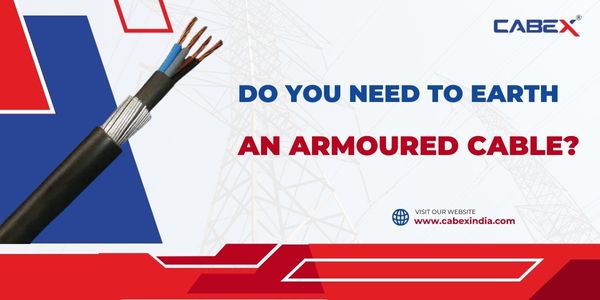Introduction
Do You Need to Earth an Armoured Cable? Armoured cables play a crucial role in providing protection and durability to electrical wiring systems. One common question that often arises is whether it’s necessary to earth an armoured cable. In this comprehensive guide, we will delve into the importance of earthing armoured cables, the reasons behind it, and the best practices to ensure safety and compliance. So, if you’re wondering about the necessity of earthing for armoured cables, read on to get a clear understanding.
Understanding Armoured Cables
Before we dive into the specifics of earthing, let’s briefly understand what armoured cables are. Armoured cables are electrical cables that are encased in a metal or plastic sheath, providing an extra layer of protection. These cables are commonly used in various applications, including power distribution, industrial installations, and outdoor wiring. The primary purpose of the armor is to shield the cable from mechanical damage, moisture, and other environmental factors, ensuring the safety and longevity of the electrical system.
The Importance of Earthing
Now, let’s address the central question: Do you need to earth an armoured cable? The short answer is yes, and here’s why:
- Safety First: Earthing is essential for the safety of both individuals and equipment. An armoured cable may become live due to faults or insulation breakdowns. If not properly earthed, this could lead to electric shock hazards for anyone coming into contact with the cable or surrounding structures.
- Fault Current Dispersal: In the event of a fault, such as a short circuit, the excess current needs a path to dissipate. Earthing provides a low-resistance path for fault currents to flow safely into the ground, preventing damage to the cable itself and reducing the risk of fire.
- Voltage Stabilization: Earthing helps stabilize the voltage levels in the electrical system. Without proper earthing, voltage fluctuations could occur, leading to equipment malfunction and potential damage.
- Compliance: Many electrical codes and regulations mandate the earthing of cables for safety and operational reasons. Failing to adhere to these standards could result in legal and regulatory consequences.
How to Properly Earth an Armoured Cable
Now that we understand the importance of earthing, let’s explore the proper steps to earth an armoured cable effectively:
- Selecting the Earthing Method: There are a few methods to earth armoured cables, including direct earthing, earthing through the cable armor, or using separate earth wires. The method you choose should be based on factors such as the application, environment, and local regulations.
- Grounding Electrodes: Proper grounding electrodes, such as grounding rods or plates, need to be installed. These electrodes ensure a reliable connection between the cable’s earth conductor and the Earth’s ground.
- Connection Integrity: The connection between the cable’s earth conductor and the grounding electrode must be secure and low-resistance. Proper clamps, connectors, and exothermic welding are commonly used to achieve this.
- Regular Maintenance: Earthing systems should be regularly inspected and maintained to ensure their effectiveness. Corrosion, loose connections, or other issues can compromise the system’s performance.
- Professional Expertise: It’s highly recommended to involve a certified electrician or electrical engineer when designing and installing the earthing system. Their expertise will ensure compliance with regulations and best practices.
Conclusion
In conclusion, earthing an armoured cable is not just a choice; it’s a necessity for ensuring safety, preventing hazards, and maintaining the integrity of electrical systems. By providing a safe path for fault currents and stabilizing voltage levels, proper earthing contributes to the efficient and reliable operation of electrical installations. Always prioritize compliance with regulations and enlist the help of professionals to design and install the earthing system correctly. Remember, when it comes to electrical safety, there’s no room for compromise.
So, the next time you ask, “Do you need to earth an armoured cable?” the answer is a resounding yes. Invest in a robust earthing system to protect lives, property, and the functionality of your electrical infrastructure.
FAQ:
Is armoured cable earthed?
Yes, armoured cable is typically earthed. The metallic armouring provides grounding, enhancing safety by directing potential electrical faults to the ground. Always follow proper installation guidelines for safety.
Should armoured cable be earthed at both ends?
Yes, armoured cable should typically be earthed at both ends for proper grounding and safety. This helps to prevent electrical hazards, reduce the risk of electric shock, and maintain equipment integrity.
Where is the earth on armoured cable?
The Earth wire in an armored cable is typically positioned between the live and neutral wires. It provides a path for fault currents, enhancing safety by preventing electric shocks and fires.
Advantages of armoured cable
Enhanced protection: Armoured cables have metal sheathing that safeguards against physical damage and external elements.
Durability: They are highly resilient, suitable for harsh environments.
Longevity: Extended lifespan due to robust construction.
Secure wiring: Suitable for underground and outdoor installations.
Reduced maintenance: Minimal risk of cable breakage or interference.
Single core cable armour earthing
Single-core cable armor is not typically used for earthing, as it’s designed for mechanical protection. Earthing is usually done using dedicated conductors or systems to ensure safety and proper grounding.






